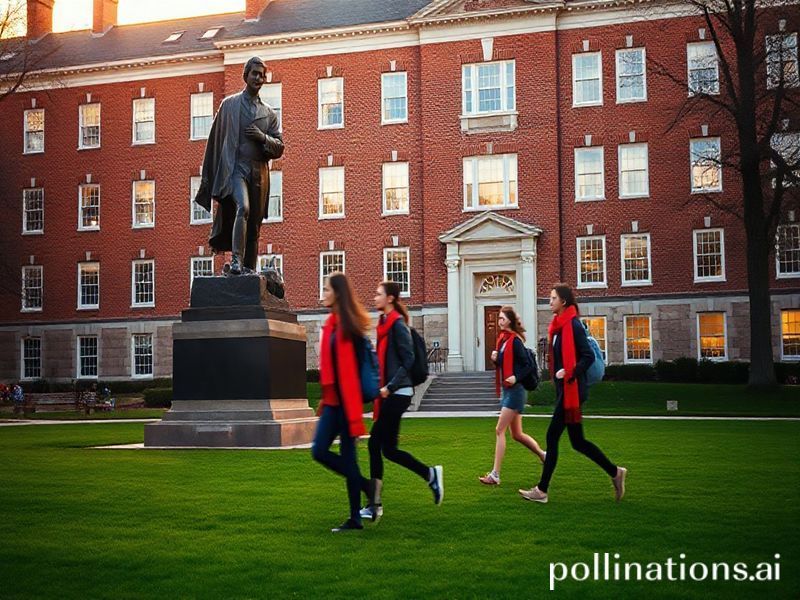harvard
Harvard, that venerable brick-and-ivy ATM for the ruling class, has lately become the planet’s most expensive piñata. From Brasília boardrooms to Bangalore coffee shops, the university is now cited as shorthand for a global elite that can’t quite decide whether it’s enlightened or simply entitled. When the Supreme Court clipped its affirmative-action wings last June, the sigh of relief in certain corners of the developing world was almost loud enough to drown out the endowment’s interest income. “Finally,” muttered a Kenyan policy analyst over lukewarm Tusker, “the Americans are discovering the joys of meritocracy—thirty years after we were told to swallow structural adjustment.”
The numbers, as always, are both obscene and mesmerizing. A $50.7 billion endowment—larger than the GDP of Serbia or Bolivia—means Harvard could pay every undergraduate’s tuition in perpetuity and still have enough left over to bribe a small asteroid. Instead, it charges $79,450 a year, then politely invites the Global South to apply for “need-blind” aid, a phrase that sounds like a kindness until you realize it translates to “blind to your need for dignity.” Last year, the university admitted 3.41 percent of applicants, a figure that makes North Korean elections look competitive and that has inspired a cottage industry of consultants from Lagos to Lima who promise to transmute teenage angst into Ivy League gold—for a fee roughly equal to Liberia’s health budget.
Internationally, Harvard has become the Harvard of geopolitical soft power. Chinese tech tycoons sport crimson hoodies while negotiating data-extraction deals; Gulf sheikhdoms endow entire departments in exchange for glossy reports proving that monarchy is compatible with innovation. Even the Taliban, never shy about book-burning, once sent a delegation to audit a Harvard executive-education seminar on “Negotiation Strategies,” presumably taking notes on how to say no while sounding collegial.
All of this might be harmless theater if Harvard’s halo effect didn’t ripple quite so far. IMF economists who cut their teeth on its riverbank seminars prescribe austerity with the same certainty medieval scholastics debated angels. Silicon Valley titans who dropped out of CS50 lecture halls now design digital fiefdoms from which billions cannot log off. And when a Harvard epidemiologist tweets, governments from Jakarta to Johannesburg recalibrate their pandemic policies—sometimes wisely, sometimes because panic travels faster than peer review.
Yet beneath the crimson gloss lurks a darker joke: the institution that mints tomorrow’s masters of the universe still can’t figure out how to prevent its own dining-hall workers from going on strike. The optics are deliciously grim—scholars of inequality stepping over picket lines to discuss Piketty—and they provide a convenient morality tale for anyone convinced that meritocracy is just aristocracy with better branding.
Still, one must concede Harvard’s perverse genius: it has globalized the idea that intelligence equals credential, and that credential equals access to the cockpit of history. Whether that cockpit is steering us toward utopia or the nearest cliff remains an open question, but the in-flight wine list is excellent.
In the end, Harvard is less a university than a planetary mood ring: it reflects who we think deserves to run things, and how much we’re willing to pay—literally and existentially—for the illusion of enlightened rule. The rest of us, passport stamps and student-loan statements in hand, can only watch from economy class and hope the autopilot was programmed by someone who actually attended lecture.







